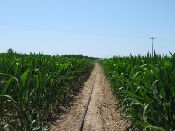|
Area and people
The study site area is proposed to be the first GEO-park of Turkey. Area with this status have special ecological, environmental, educational aspects. The potential for eco-tourism is high. In a GEO-park use and protection is combined. The decision on the status of the area is expected within about two years.
Volcanic area that is associated with Cappadocia. Cereal farming and sheep farming are traditional systems. The traditional land use system is Barley-welch-wheat-fallow. The system is no longer economically rewarding enough. The GEO park idea is discussed in the stakeholder workshops.
Study site stakeholders workshops
Organizations involved in the GEO-park
- Natural education ministry
- Soil and water conservation institute
- Agricultural management
Added value of DESIRE for stakeholders
Discussion of alternative farming methods and improving contact between various actors. New farming methods discussed included:
- cage animal breeding
- drip irrigation
- citrus cultivation
- rotational grazing to protect pasture.
Limitations for spontaneous implementation of soil and water conservation practices
The government provides funds for alternative practices but people value their own traditional systems. Only 10% adopted drip irrigation. Surplus money is invested in consumption goods and is not invested back in farming, affecting the sustainability and productivity of the farming method.
Stakeholder groups
- State Water Works, Konya Branch: The local branch of the primary executive state agency for elimination of adverse effects of Turkey’s surface and groundwater and putting them in public utilization in various ways such as hydropower, irrigation, domestic and industrial use.
- Soil and Water Research Institute: Branch of an organization (The Ministry of Agriculture and Rural Service) aimed at the development, conservation or suitable exploitation of the soil and water resources.
- General Directorate of Provincial Agriculture, Konya branch: A governmental organization responsible for the promotion of agricultural activities within the provincial boundaries.
- Provincial Directorate for the Environment and Forestry: Local state branch responsible for reforestation and environmental rehabilitation and protection.
- TEMA: A Turkish NGO for combating soil erosion, for restoration and protection of natural habitats.
- Foundation For The Reinforcement of the General Directorate of National Parks and Game-Wild Life : A Turkish NGO focused on the protection of environment with its wild life.
- UNCCD National Focal point: The national connection point against desertification founded under the Research, planning and co-ordination board of the Ministry of Environment and Forestry.
- Karapinar Municipality: Decision maker and execution authority within the municipality boundary with respect to land management and related subjects.
- Local Irrigation Unions: The union of villagers (end-users) for provision of surface and ground waters to their farms.
- Local Farmer Unions: The union of villagers for increasing the crop amount and quality.
- Ministry of National Education, Directorate of Karapinar District: Governmental organization, authorized for the education of children from primary school to lycee.
- Selçuk University, Faculty of Agriculture: A developed rural university, with many raised academics, and undergraduate and postgraduates in various fields of agriculture.
Sustainability goals
The question of sustainability can be approached in different ways according to land use types involved. Since the pasturelands are already mostly spoiled in regard to biological diversity, it can hardly be talked about sustainability of pasturelands. Actually cattle breeding which is rapidly decreasing in extend and intensity, almost totally relies on fenced feeding. Therefore, before putting forward some sustainability goals, pasturelands of the region should radically be rehabilitated.
As with the cropland which is mostly irrigated type, basic sustainability goal designated by governmental organizations and farmer unions includes preservation of groundwater resources and productivity of the soil. The former is regarded particularly significant since the groundwater level costs much electricity consumption and soil degradation. A variety of attempts ranging from legal limitation of free boreholing to partial funding of new cost-efficient irrigation techniques are under way. Other basic goals involve protection of soil fertility by careful use of chemical fertilisers and suitable soil tillage methods against wind erosion. Selected technologies to be held in the Karapinar hotspot overlap with the sustainability goals of the area.
The table shows the sustainability goals that were identified for Karapinar study site.
| Goal 1 |
Rehabilitation of pasture lands |
| Goal 2 |
Preservation of groundwater resources |
| Goal 3 |
Increase soil productivity |
| Goal 4 |
Soil fertility protection |
Source: information from farmer interviews, governmental organizations and farmer unions and expert estimates.
|



